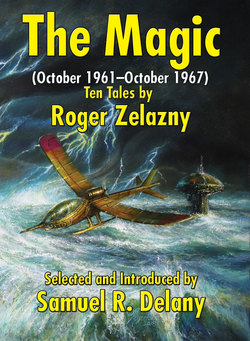Читать книгу The Magic (October 1961–October 1967) - Roger Zelazny - Страница 15
На сайте Литреса книга снята с продажи.
A Word from Zelazny
Оглавление“I had a strong sentimental attachment to what is now called ‘space opera.’ . . . I had long wanted to do something of that sort. When I began selling fiction in the sixties it was too late—almost. The space program had already invalidated the Mars and Venus of Edgar Rice Burroughs—almost . . . If I wanted to do homage . . . I would have to act quickly and do my best. I knew that I would only be allowed one shot at each world, and then I would have to leave the solar system. ‘A Rose For Ecclesiastes’ was my only word on Mars. ‘The Doors of His Face, the Lamps of His Mouth’ all that I would have to say on Venus. So I did it. I wrote them both and got in under the wire.”1
Zelazny usually gave noncommittal answers when asked if the poet Gallinger had any resemblance to Zelazny himself, but he did give a very personal response to letter writer Clara on this very subject: “You ask me why I hated Gallinger so in ‘A Rose For Ecclesiastes.’ The answer is that I hated him because he was me. Once in my life I let a beautiful thing die, and now it can never be. Details are not important, in that they would add nothing. The story says what it must and stands or falls on its own merits. But you’re right in your observation that it’s a sad story, despite the fact that you felt crushed and even cheated. Life is full of these things, and one of them motivated this tale. I didn’t want it to end that way, but it had to, because he was me. I felt pain along with him. He was a better linguist than I, and a better poet. He was a very good, misunderstood man. There is a sequel to the story which I will never write, where he goes back to Mars some years later. It is much sadder, believe me, and he doesn’t deserve to be put through those paces. He’s suffered enough. But sometimes things happen this way, and all that you can say is, ‘Look. This is the way things are.’ That’s all.”2 Zelazny was alluding to events that caused the breakup of his six month engagement to Hedy West; he wrote this story shortly after.
This story was actually written in October 1961, five months prior to “Passion Play,” but Zelazny had declined to submit it then because he knew that the Mars depicted within the story had lost all credibility by 1962. Critics and other authors greeted the story enthusiastically, assuming it reflected rapid maturation in his writing. In fact, he wrote it before his earlier published works.3 It is unclear whether he’d revised it at all before submitting it.
Consistent with his intention to follow Hemingway’s dictum to leave certain things unsaid, Zelazny did not reveal Gallinger’s first name, Michael, in the story. “It wasn’t important; I had no reason for using his first name . . . If the writer sees more of the story than he actually tells, it adds strength to the story. It makes the character seem more real.”4
